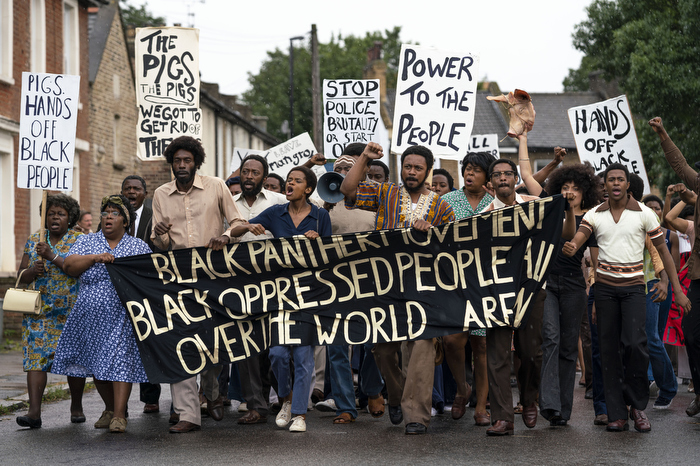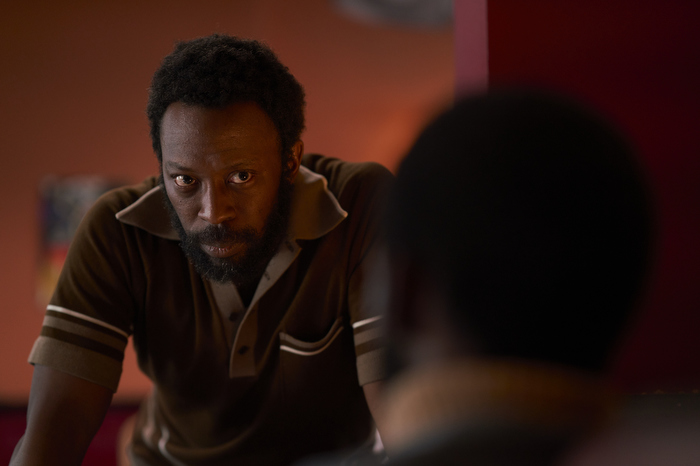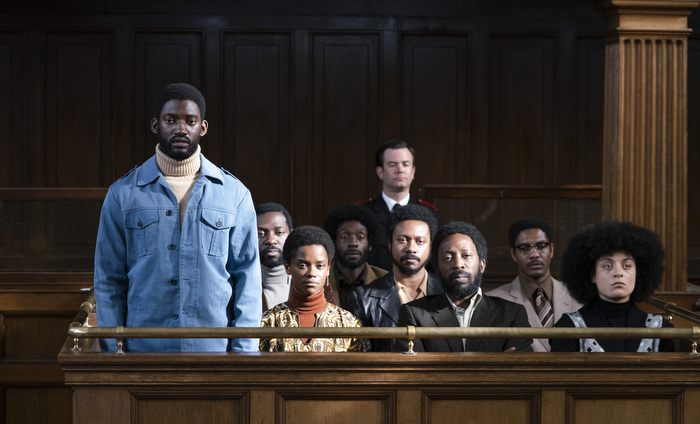
You would think, as time marches forward, that human civilization would become smarter, more compassionate, more open to understanding life the way others live it. But increasingly, it seems that we can barely see beyond the limits of our own experience. Feelings—our own, that is—have become king. Our personal world is the only one that matters.
That’s the environment into which Mangrove—the first of a five-film anthology by visual artist and filmmaker Steve McQueen, called Small Axe—is catapulting. The films of Small Axe (which will stream on Amazon Prime through November and December) are stories about the lives of Black people in Britain from the late 1960s to the mid-1980s, specifically those known as the “Windrush generation,” a group of immigrants, largely from the Caribbean, who were invited by the British government to help jump-start the country’s economy after World War II. (The Empire Windrush was one of the first ships to bring these individuals from the West Indies to Great Britain in the late 1940s.) The stories McQueen is telling are ones that most white people in the United States—maybe most white people anywhere—have never heard. They’re fresh territory, and white viewers’ openness to them may be a kind of test. Mangrove, based on a true story, is a courtroom drama. But more broadly, it’s a story about fighting for your right to build a livelihood, to gather with friends, to live joyously. The harder you have to fight for those privileges—which, in a just world, wouldn’t be privileges at all—the more valuable they become.

It’s 1968 and Frank Crichlow (Shaun Parkes) has just opened the Mangrove, a small restaurant in Notting Hill, a neighborhood with a large Caribbean population. Before long, the place is bustling. Cozy and inviting and dedicated to serving food that’s the exact opposite of the traditional bland English specialties, it’s a spot where locals can gather, and intellectuals and activists, including members of the British Black Panther movement, are drawn to it. But an overtly racist police constable named Pulley (Sam Spruell), has Crichlow and his restaurant in his sights. He and his cohorts raid the place repeatedly and destructively, for no good reason. (Their excuse is that Crichlow formerly ran a gambling establishment.) Customers become fearful and stop coming to the Mangrove; Crichlow thinks he might have to shut down. But a few of his regulars, among them Black Panther organizer Altheia Jones (Letitia Wright, who played Shuri in Black Panther) and activists Darcus Howe and Barbara Beese (Malachi Kirby and Rochenda Sandall) come to him with a plan: he and the community should protest the police bullying and violence—which goes far beyond the raids on the Mangrove—by holding a protest. The resulting demonstration is boisterous but peaceful, until Pulley crashes in with his men and begins making arrests, charging the group with inciting a riot.
The 1970 trial of Crichlow, the organizers and some of the participants, collectively known as the Mangrove Nine, is the chief focus of Mangrove. And much like another recent ensemble courtroom drama, Aaron Sorkin’s The Trial of the Chicago 7, it pits a group of passionate, justice-seeking individuals against a stodgy white power structure. The difference is that the position of Crichlow and his cohorts—people who are just trying to live peacefully in their own community—is more purely a stance against outright racism, and McQueen’s dramatization of their fight works like gangbusters. That’s partly because he sets up Crichlow’s predicament so clearly: the Mangrove, as he and cinematographer Shabier Kirchner show it to us in the movie’s early scenes, is a vibrant joint with brightly painted walls, radiating laughter and warmth—you look at it and wonder, who wouldn’t want to have a place like that to go? And just as Crichlow has suffered his umpteenth police raid and is thinking of throwing in the towel, an elderly patron comes in and offers him a biscuit tin filled with cash she’s saved over the years, urging him to use it to keep the restaurant going. She tells him the place is “my home from home now.”

That moment, in all its blazing tenderness, holds the key to the film’s power. Crichlow and his patrons have as much right to make a home, a community, in Britain as anyone. As newcomers, they’ve had no role in the nation’s storied past, but they’re the door to its future. McQueen, a meticulous craftsperson, has made some films about very serious historical subjects: 12 Years a Slave is based on the true story of a free Black man who was kidnaped and sold into slavery in the 1840s; Hunger details the hunger strike and death of Northern Irish activist Bobby Sands. Mangrove, too, tells a sometimes harrowing real-life story. Yet it has a lightness of touch that McQueen hasn’t shown before. Mangrove, as is all of Small Axe, is personal for McQueen—he is of West Indian descent himself—and his affection for these characters, as well as his passion for their cause, ignites his telling of their story. Most Americans, and probably many in Great Britain, don’t know the story of the Mangrove Nine. But almost everybody can understand what it means to need a home from home, and how, when you find it, it’s worth fighting for.
More Must-Reads from TIME
- Why Biden Dropped Out
- Ukraine’s Plan to Survive Trump
- The Rise of a New Kind of Parenting Guru
- The Chaos and Commotion of the RNC in Photos
- Why We All Have a Stake in Twisters’ Success
- 8 Eating Habits That Actually Improve Your Sleep
- Welcome to the Noah Lyles Olympics
- Get Our Paris Olympics Newsletter in Your Inbox
Contact us at letters@time.com